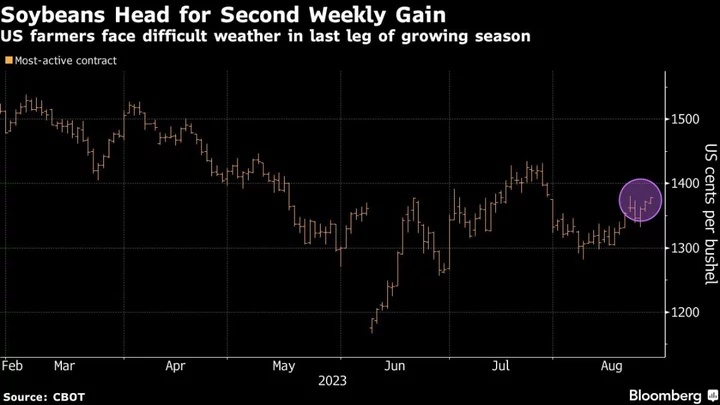
Meet the cast of the new dark comedy 'Bottoms'
The new dark comedy "Bottoms" is getting a lot of buzz.
2023-08-26 03:53

Pilot killed in US military jet crash in San Diego
The Marine Corps has launched an investigation into the crash of the F/A-18 Hornet fighter plane.
2023-08-26 03:29

Cristian Romero reveals what Ange Postecoglou has changed at Tottenham
Cristian Romero explains how Ange Postecoglou has turned things around at Tottenham.
2023-08-26 01:17

Soy Heads for Second Weekly Gain as US Heat Curbs Crop Yields
US soybean prices rose for a second straight week, as excessive heat and dryness threaten to further erode
2023-08-26 00:51

How to keep the next 'dash for cash' from crashing bond market - study
JACKSON HOLE, Wyoming Preventing the $25 trillion U.S. Treasury market from seizing up in a future crisis, as
2023-08-26 00:23

Fed's Powell says central bank may need to raise interest rates further
NEW YORK/LONDON The U.S. Federal Reserve may need to raise interest rates further to ensure inflation is contained,
2023-08-26 00:20

Simulation discovers what personality traits you would need to go to Mars
If the thought of jetting off to Mars to live doesn’t scare you enough, imagine what it would be like going with people whose personalities you cannot stand. To avoid that happening, scientists have come up with a simulation that can determine the right and, importantly, wrong, personality types to send up to colonize Mars. 28 different simulations of colonies on Mars were run as part of the study to establish which type of people stood the best chance of settlement and survival. While the study was published on pre-print server arXiv, it had not yet been peer-reviewed. The study worked on the assumption that there would already be some kind of infrastructure in place, including power, food, air and water being locally produced and available. As part of the model, there would also be regular supply deliveries from Earth. Those behind the simulation gave each agent their own attributes, skills and personalities and let the simulation run as they interacted, socialised and problem-solved together. In the paper, the researchers explained: “Each agent is granted skills associated with their civilian and military occupational specialities consistent with NASA’s Human Factors and Behavioral Performance Element research.” Different personality types included: “Agreeables” – they score low on levels of competitiveness and aggression. “Neurotics” – these people are highly aggressive, competitive, and are much less able to handle routine change or boredom. “Reactives” – they tend to have a “competitive interpersonal orientation”. “Socials” – people who are extroverted and require a lot of social interaction. As for the groups themselves, the numbers within each simulation differed with the lowest amount being 22 individuals. The study found that the presence of neurotics made the team have a worse chance of survival and that these people in particular “suffered during life on the colony”. The researchers: “Martians with the neurotic psychology and a high coping capacity benefit the least from interaction with other Martians, and are penalized the most if they have a low coping capacity. “Our results suggest that this effect is a driver of the Martian population decline, and once minimized or removed, can produce a stable settlement.” A lot to process there if you identify as neurotic. Sign up to our free Indy100 weekly newsletter Have your say in our news democracy. Click the upvote icon at the top of the page to help raise this article through the indy100 rankings.
2023-08-25 23:56

Maui wildfires: Officials release list of 388 people still missing
Authorities want any survivors on the list to come forward in order to narrow down the search.
2023-08-25 22:53

Chiefs Rumors: Mahomes shocked by Jones, Brittany Mahomes correction, Karlaftis update
Kansas City Chiefs Rumors: Patrick Mahomes shocked by Chris Jones holdout, Brittany Mahomes corrects fans on a theory and more.
2023-08-25 22:20

Kim Cattrall loves Selena Gomez's TikTok tribute to Samantha Jones
Kim Cattrall has given her stamp of approval to Selena Gomez's TikTok tribute to Samantha Jones. The 67-year-old played the confident public relations professional in Sex And The City and recently reprised the fan-favourite character during a guest appearance in the season two finale of the spin-off series And Just Like That... But an iconic quote from Samantha Jones has been going viral on TikTok, from a SATC scene where a married lover of hers calls to inform that he has broken up with his wife - only for her not to recognise who he is. "I told my wife," the man said on the phone, to which Jones replied: "Who is this?" Many people have been miming the scene on TikTok, including Selena Gomez who made the video to promote her new single called Single Soon which dropped today (August 25). The video received over 43.2m and so managed to gain the attention of Cattrall herself. Taking to Twitter/X, the actor retweeted the clip and in the quote tweet wrote: "I approve this message," with the lip print emoji. Fans loved seeing Cattrall interact with Gomez's tribute to her character. Meanwhile, Catrall's And Just Like That cameo was 71 seconds long in a short but sweet appearance where she spoke to Carrie Bradshaw (Sarah Jessica Parker) on the phone from a taxi as she couldn't make it to New York to say her goodbye's to the apartment Carrie is moving out of due to her flight being delayed. Elsewhere, Selena Gomez video has fans convinced she's shading Justin Bieber and Selena Gomez wrapped in a blanket has become an instant meme. Sign up to our free Indy100 weekly newsletter Have your say in our news democracy. Click the upvote icon at the top of the page to help raise this article through the indy100 rankings.
2023-08-25 21:57

This is how stress affects different parts of the body
The increased focus on mental health in the last few years has seen more and more people turning to things like mindfulness, meditation and talking therapies to cope with stress. While these techniques can be very effective, it’s important to remember that stress isn’t ‘all in your head’ – it can have a serious physical impact as well. “Stress is how you feel and respond when life puts you under a lot of pressure,” says Dr Luke Powles, associate clinical director at Bupa Health Clinics. “A certain amount of stress can be positive, as it can help you prepare for challenges and respond to them,” Powles adds. “But too much stress, especially over a long period of time, can cause both mental and physical problems.” That’s why it’s vital to look at the sources of stress in your life and be aware of both the short and long-term symptoms. Here’s how stress can affect different parts of the body… Heart and lungs A sudden surge of stress can make you feel like you’ve just run up several flights of stairs. “Immediately, you’re going to get an increase in your heart rate, with that almost panic attack or anxiety-like feeling,” says Dr Alka Patel, aka the Health Hacktivation Doctor. “Your breathing rate is going to speed up as well, because you’re trying to oxygenate your blood.” That’s also why you might get sweaty palms or pits: “You get vasodilatation of your blood vessels – you’re basically trying to increase blood flow to your body, so sweating is a very immediate phenomenon for most people.” Stressful situations can raise your blood pressure temporarily too, Powell says: “If you’re stressed over a long time, you could possibly develop long-term high blood pressure.” The link between stress and heart disease is mitigated by other factors. “Stress may not directly cause coronary heart disease, such as a heart attack or stroke and cholesterol,” says Powell. “But if you smoke, drink, or eat more to cope with stress, you increase your risk of these. Stress may also increase the risk of type 2 diabetes.” Doctors also warn about heart rate variability (HRV), meaning the variation in the pauses between heartbeats. “You want a high HRV because you want to be adaptable,” Patel explains. “When you’re under chronic stress your HRV starts to drop, and that tells you that you’re not resilient in the face of stress.” Stomach and gut Feeling too anxious to eat? Or craving carbs when you’re under pressure? “You’re releasing this surge of cortisol, the stress hormone, very quickly, which is then trying to get as much sugar and fuel on board,” Patel explains. “A lot of people will then either notice the hunger response: ‘I’ve got to eat lunch to manage my stress’. Or you notice the dip, which is: ‘I don’t want to eat, I can’t eat anything else’.” You might experience digestive issues as well, she continues: “With an immediate stress reaction, everything else in your body has to stop. This means you can start to get those symptoms of diarrhoea, upset stomach, that kind of thing, because all of those digestive processes have to have to halt in order to manage your stress.” There are also some links between chronic stress and certain illnesses, including digestive complaints. “If you have a pre-existing health condition, stress could make it worse, or flare up,” says Powell. “Examples of conditions that can be aggravated by stress include irritable bowel syndrome, eczema, asthma and psoriasis.” Muscles A surge of stress can cause muscle spasms called fasciculation and tension in the cervical muscles of the neck, which might lead to a headache. “People don’t necessarily associate headaches with muscles, but you can get spasms in your upper neck muscles and shoulders,” Patel says. “You feel the tension in the muscles going over your scalp – and that’s why we call these tension headaches.” Teeth and mouth Stress can also harm your oral health, which should be dealt with by a dentist. “Teeth grinding (bruxism) is often linked to stress, but lots of people aren’t aware they have the condition because it happens in their sleep,” says Powell. “Symptoms include headaches, earache, stiffness and pain in the jaw or mouth; teeth which are breaking or look worn down; and facial swelling.” Inflammageing A hot topic among longevity specialists in recent years, ‘inflammageing’ means chronic inflammation that has a damaging effect and is caused by a variety of diet and lifestyle factors. “Stress accelerates ageing, and then there’s a whole cascade of stuff that goes on as a result of that,” says Patel. “[It affects] your immune response, the communication between your cells, muscle function and your bones.”
2023-08-25 21:24

Boil water advisory for parts of San Diego due to E. Coli
A boil water advisory has been issued for parts of San Diego, California, and surrounding areas that will last through the weekend.
2023-08-25 20:46
